Those of us with Hashimoto’s often blame our thyroid for the many signs and symptoms we experience.
Hair loss? Thyroid!
Weight gain? THYROID!
Fatigue? It’s gotta be the THYROID!
While the thyroid plays a crucial role in these symptoms and our well-being, there’s another link that’s often underestimated: the adrenal glands. Treating hypothyroidism without treating the adrenals, is one of the biggest reasons people continue to feel exhausted despite receiving treatment with thyroid hormones.
Patients may initially report feeling more energetic after starting thyroid hormones, but this is usually followed by feeling worse and worse… until they are right back to where they were before they started the thyroid medications. At this point, they will likely go back to their physicians to check blood work, and will be told that everything is normal.
The patient begins to feel crazy… but that’s when another layer of the complex pathology of Hashimoto’s becomes unraveled. Many symptoms of hypothyroidism overlap with symptoms of underactive adrenals. However, physicians don’t routinely check adrenal function in those with Hashimoto’s.
In this article, I’ll discuss:
- What is the connection between thyroid issues and adrenal dysfunction?
- What causes adrenal dysfunction?
- Symptoms of adrenal dysfunction
- How to test your adrenal function
- The Root Cause approach to recovering from adrenal dysfunction
What Are the Adrenals?
The adrenals are two small glands, located on top of each kidney, that release hormones such as cortisol and adrenaline. These “stress hormones” impact many important functions throughout the body. They help establish your stress tolerance, tame inflammation, regulate blood sugar and body fat, control potassium and sodium levels (impacting blood sugar), and influence sex drive and anti-aging… among other things. [1]
You may have heard that the stress hormone cortisol is “bad.” This is misleading — while high levels of cortisol are problematic, what could be equally or more problematic is having low levels of cortisol, especially when it comes to having an autoimmune disease and fatigue.
Cortisol is a hormone that is required for life — we could not live without it, and it is an important anti-inflammatory hormone. In fact, it gets released whenever we have inflammation, to cool things down.
I have found that the majority of people with Hashimoto’s have low levels of cortisol.
What Causes Adrenal Fatigue?
In most cases of adrenal fatigue, the problems generally originate in a communication breakdown that occurs within the hypothalamic-pituitary-adrenal axis, otherwise known as the HPA axis. [2] The HPA axis describes the interactive feedback loop that takes place between these three endocrine glands.
The hypothalamus is like the CEO of our body’s production of hormones. It scans messages from our environment and other endocrine glands, as well as checks the body’s overall hormonal status, before passing on the order for more hormones to the pituitary gland. The pituitary gland then acts as a project manager and will pull together individual workers (like the thyroid gland, the adrenal gland, and the gonads) to do their jobs. The pituitary will also make sure the workers have adequate resources to do their jobs by managing growth and repair, as well as electrolyte/water balance.
The HPA axis works in response to two types of stress: immediate stress and chronic stress. Let’s see how the responses to each type differ.
In cases of immediate stress, the hypothalamus senses stress and sets off a hormone cascade that leads to the activation of our fight-or-flight response. As part of this response, the adrenals pump out extra hormones, and our bodies go from the state of relaxing, digesting and healing, to a survival state.
Our body’s energy is shifted from activities not essential to survival, like growing beautiful hair, metabolizing nutrients into energy, making hormones, and digesting and repairing itself, to instead focusing its resources to meet the great, stress-induced demand for cortisol and adrenaline.
Then, once we’ve escaped from the threatening bear or gotten out of the way of the oncoming car, the demand for emergency levels of hormones settles down, and the focus once again turns to the parasympathetic response, focused on body maintenance and upkeep.
In cases of chronic stress, the never-ending presence of stressful, yet non-life-threatening, situations can lead to the constant activation of the stress response.
To help meet the demand for cortisol, your body will decrease the production of other hormones normally produced by the adrenals such as progesterone, DHEA, and testosterone. [3]
Eventually, with enough chronic stress, the HPA axis becomes overwhelmed and desensitized to the usual feedback loop, and stops sending messages to the adrenals to produce more hormones or less hormones, no matter what’s happening. [4] Additionally, a person may run out of nutrients that are required for proper adrenal function.
One of the most common causes of adrenal fatigue is stress, which creates an intense demand for stress hormones such as cortisol and adrenaline.
If you are struggling with chronic stress, I encourage you to investigate these four common root causes or triggers:
1. Sleep Disorders
One of the fastest ways to induce adrenal dysfunction is through sleep deprivation. In fact, sleep deprivation is used in lab animals to suppress the hypothalamic-pituitary (HPA) axis and adrenal axis. [5] Sleep deprivation can be caused by insomnia, sleep apnea, and shift work.
2. Mental/Emotional Stress
Feelings such as grief, guilt, fear, anxiety, excitement, and embarrassment can be classified as stress. This stress is based on our perception, not on the nature of the individual stress. For example, public speaking may cause plenty of mental stress for someone with social anxiety, but another person who enjoys speaking in front of others may perceive the experience as pleasurable. Situations that are new, unpredictable, and threaten the ego, or that involve feeling a loss of control, are perceived as stressful.
3. Metabolic/Glycemic Dysregulation
Researchers in Poland have found that up to 50 percent of patients with Hashimoto’s have an impaired tolerance to carbohydrates. [6] This means that after consuming carbohydrate-rich foods, their blood sugar levels would spike up very high, causing a great amount of insulin release.
The role of insulin is to clear blood sugar out of our cells, so a large insulin release is followed by a rapid drop of blood sugar (hypoglycemia).
Symptoms of hypoglycemia are very unpleasant and may include irritability, fainting, lightheadedness, or tremors. Hypoglycemia necessitates the release of cortisol to help maintain the glucose supply to the brain and counteracts insulin, causing insulin resistance. [7] (This is also linked to the type 2 diabetes epidemic.)
4. Inflammation
Chronic inflammation may occur from joint pain, obesity, toxic burden, inflammation in the GI tract from irritable bowel disorders, pathogens, or food sensitivities. These conditions will signal cortisol for its anti-inflammatory effect. [8]
Common Symptoms of Adrenal Dysfunction
Symptoms of poor adrenal function may include the following: [9]
- Feeling overwhelmed
- Feeling tired despite adequate sleep
- Trouble falling asleep or staying asleep
- Difficulty getting up in the morning
- Dependency on caffeine
- Cravings for salty foods (a.k.a. the “I just ate a whole bag of chips syndrome”)
- Cravings for sweet foods
- Increased effort required for everyday activities
- Intolerance to exercise
- Low blood pressure
- Feeling faint/dizzy when getting up quickly
- Easily startled
- Mental fog or trouble concentrating
- Alternating diarrhea/constipation
- Low blood sugar
- Decreased sex drive
- Decreased ability to handle stress
- Longer healing time
- Mild depression
- Less enjoyment in life
- Feeling worse after skipping meals
- Increased PMS
- Reduced ability to make decisions
- Reduced productivity
- Poor memory
Do any of these sound familiar?
Testing for Adrenal Issues
In addition to looking at your symptoms, you can determine if you have adrenal dysfunction by utilizing the assessments below.
The Irritability Test
Irritability and overwhelm are two cardinal signs of adrenal dysfunction. My best test for determining adrenal issues is being snappy or short-tempered, feeling overwhelmed, or finding other people annoying. For example, I can always tell that my adrenals are overwhelmed when my mom calls to say hello, and I feel like this is too much of a demand!
Blood Pressure Test
People with adrenal fatigue often have low blood pressure and/or a drop in blood pressure after standing up from a lying down or sitting position (orthostatic hypotension). [10] They may also experience dizziness or lightheadedness when changing positions.
A great way to test for this is by measuring your blood pressure while lying down, then standing up and measuring your blood pressure again. This is a common test functional doctors perform to determine the adrenal function of a patient.
If your blood pressure is below 120/80 mmHg, this may mean that your adrenals are underactive, or that you are dehydrated.
Pupil Contraction
People with low adrenal function may often have difficulty contracting their pupils. Usually our pupils dilate (enlarge) in the dark, and contract (get smaller) in the light. Symptoms of adrenal dysfunction may include light sensitivity, difficulty seeing in bright lights, having to wear sunglasses on most days, or as I like to call it, feeling like a vampire in daylight!
Unstable Temperatures
If you are keeping track of your first morning temperatures, low and unstable morning temperatures may be suggestive of adrenal insufficiency. In contrast, pure hypothyroidism usually results in temperatures that are low, but rather stable, on a daily basis.
The Whole Bag of Chips Test
Have you ever eaten (or wanted to eat) an entire bag of chips in one sitting? You’re not alone! Salt cravings are a cardinal sign of adrenal issues. With adrenal issues, we may find ourselves with intense cravings for salty foods like crackers, chips, pretzels, and olives.
Hormone Testing
Adrenal saliva tests provide a way to test our current adrenal function. These tests are generally only available from functional medicine and integrative health care professionals.
Normally functioning adrenals are supposed to put out the most cortisol in the morning, and the levels of cortisol should decline during the day, until very little cortisol is secreted at bedtime. A cortisol kick in the morning helps us to get out of bed bright-eyed and bushy-tailed, ready to face the day. Low cortisol secretion at bedtime helps us relax and sleep.
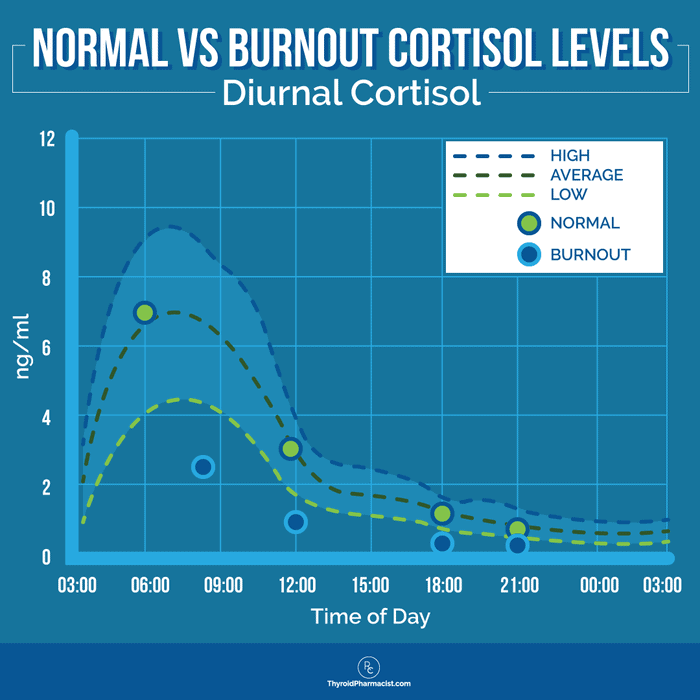
Some people with adrenal dysfunction have the opposite pattern — they can’t get up in the morning and drag their feet until the early afternoon, feel slightly human for a few hours between 2 pm and 8 pm, then get a second wind at bedtime. These people often have a flipped cortisol rhythm, where their adrenals put out very little cortisol in the morning and too much in the evening, causing them to be alert and sleepy at the wrong times.
Other people may have abnormally low cortisol readings all day, every day. In this case, the fatigue lasts all day — I have been there, and it’s not fun. This low cortisol causes inflammation to go unchecked in the body, prevents healing, and causes the person to be sluggish for most of the day.
If you’re going to go down the road of adrenal saliva testing, I recommend the Adrenal Stress Profile test by ZRT.
I recommend this test to all of my clients with Hashimoto’s, and have found that 90 percent of my clients (who do the test) have some degree of adrenal fatigue.
The Conventional Approach to Adrenal Fatigue
The adrenals are a source of disagreement between conventional medical doctors and natural practitioners. Conventional medical doctors only recognize Addison’s disease as an adrenal insufficiency disorder, but do not recognize “adrenal fatigue” as a medical diagnosis. [11] (Adrenal insufficiency associated with Addison’s disease, which is an autoimmune condition, is more due to autoimmune damage to the adrenals, resulting in their inability to produce hormones, rather than the dysfunctional patterns of cortisol production observed in adrenal fatigue.)
When my integrative doctor first suggested that I get tested for adrenal fatigue, I “Googled” the term and found a “reputable source” that adrenal fatigue was a made-up disorder and did not exist.
Being a skeptical pharmacist, I put off testing my adrenals — I had just ventured into the world of alternative medicine, and was always afraid of people trying to take advantage of me and take my money, not realizing that they were simply trying to help.
But then I got to a point where I was just so exhausted and irritable, despite taking thyroid medications and following a gluten-free diet.
I started talking to Carter Black, RPh, my compounding pharmacist, about the symptoms I was experiencing, and he suggested that I have my adrenals tested. Mr. Black had specialized in hormones for many years and told me that the interventions for adrenal fatigue did indeed work well for many of his patients.
Finally it stuck: maybe it was hearing it from a fellow pharmacist, or maybe because he didn’t have any adrenal test kits to sell to me, that I decided to try it out.
Sure enough, I had an advanced stage of adrenal fatigue, and the recommended treatments helped me feel tremendously better!
Some may refer to adrenal fatigue as HPA axis dysfunction, but regardless, it does exist! Your symptoms and experiences are NOT in your head!
The Root Cause Approach to Recovering From Adrenal Fatigue
There are six main pillars of my Adrenal Recovery Protocol that I’ll explain more in-depth in this section. These are important elements that I outline in even greater detail in my forthcoming book, Adrenal Transformation Protocol, which is your ultimate guide to healing your adrenals.
However, before I explain these pillars, please note that I don’t recommend any of my go-to products for people with Addison’s. Individuals with Addison’s may need steroids and may need to avoid thyroid medications until they are stabilized on steroids. The different supplements and even electrolytes shared in this article can exacerbate Addison’s as well.
1. Rest
Sleep is the reset button for the adrenals. The fastest way to get into adrenal fatigue is through sleep deprivation. The fastest way to get out is to get plenty of sleep. When we sleep, our body releases human growth hormone and repairs itself. Make sure to get at least seven hours of sleep each night, and go to sleep before 10 pm. If you can pull it off, I actually recommend getting 10-12 hours of sleep per night for one month, in my adrenal-focused recovery protocols.
However, in the real world, I know not all of us are able to achieve a good night’s sleep every night, let alone sleep for 10-12 hours. Whether our kids are waking us up every two hours, or we’re working abnormal hours, getting eight hours of restful sleep every night can seem out of reach for many of us. In such cases, I recommend sleeping as much of those 10 to 12 hours as possible, and engaging in relaxation for the remaining hours (such as taking a warm Epsom salt bath).
Be sure to read my article on the sleep apnea and Hashimoto’s connection if you have unrefreshed sleep, snoring, and/or a scalloped tongue.
2. Balance Blood Sugar
Stabilizing your blood sugar through diet is a crucial step in overcoming adrenal fatigue and thyroid conditions. Balancing your blood sugar can create noticeable improvements in how you feel each day.
Aim first and foremost to eat more fats and proteins, and less sugary and starchy carbs. When consuming carbohydrate-rich foods, your blood sugar goes up too high, too quickly, causing symptoms such as nervousness, lightheadedness, anxiety, and fatigue. These swings in blood sugar can weaken your adrenals and cause a spike in your thyroid antibodies.
Two supplements that may help support blood sugar balance are carnitine and myo-inositol. Check out my article on stabilizing your blood sugar with diet for more information.
In the last few years, I started offering an Adrenal Transformation Program, which has helped thousands of my readers feel better. In fact, 92 percent of participants reported reduced mental fog, 89 percent had reduced fatigue, and 86 percent had reduced anxiety. I’m excited to announce that I’ve taken my signature program and turned it into a book, Adrenal Transformation Protocol, which will take readers through my tried and true process to transform their adrenals. It’s currently available for pre-order.

3. Reduce Stress
The most important strategy for combating adrenal fatigue does not involve dieting, supplements, medications, or testing. This strategy, however, is often the hardest to implement.
The strategy is… stress reduction.
Reducing my stress was probably the hardest lifestyle change for me to implement. I only had two settings, “GO” and “SLEEP.” I did not know how to relax, smell the roses, turn off, or unwind.
So, I came up with this list of strategies (described below) to make myself more relaxed and shift my body into a state of relaxing, digesting, and healing. These days, I derive so much joy from life’s simple pleasures, and I hope you will soon be able to do the same! I hope some of my strategies will resonate with you, but many of you will want to come up with your own list.
Many of these items may be really difficult to implement, especially for those of us with responsibilities like jobs, children, or elderly relatives who need our care. However, somehow, you HAVE to schedule time for yourself.
We often expect our doctors to heal us, but the healing comes from within just the same. No one else will do it for you. Put it in your planner if you must.
Do your best to eliminate, simplify, delegate, automate.
Having fewer commitments on our plate, especially in the evenings, can allow for us to go to bed at a deliciously early time… and not feel guilty about it. If you are feeling overwhelmed, reflect on areas in your life that you can work on. For example, are you being bombarded by extra responsibilities around the house? If so, speak up and see if you can delegate some of your tasks to others.
Shift your mindset.
Thinking positive thoughts and practicing meditation can shift your body into “rest, digest, and heal” mode. In essence, positive thoughts and relaxation can send your body messages to promote healing. Even pausing to practice yogic breathing can lead to increased feelings of calm.
One of my favorite yogic-breathing techniques is the 4-7-8 exercise, where you breathe in for a count of 4, hold your breath for a count of 7, and then breathe out for a count of 8.
Positive thoughts can also come in the form of affirmations, which you can repeat throughout the day.
Some of the affirmations I’ve found most helpful are:
- “I love myself.”
- “I am powerful.”
- “I am healing.”
- “I am loved.”
- “The world is a safe and beautiful place.”
- “I am beautiful.”
I also recommend practicing mindfulness as a way of diminishing stress. This means pausing and truly being present in the moment; taking time to notice all of the beauty, kindness, and good things that are present in the world. And if at first you don’t see it, try looking a bit harder — you might just be surprised as you suddenly become aware of the beauty in the trees or the kindness of strangers. ?
Be mindful of what you’re listening to.
In the modern world, we are constantly bombarded with toxicity… and I don’t just mean from pesticides and pollution. News channels are meant to set off our fight-or-flight response, releasing adrenaline to keep us glued to the TV, waiting for the latest updates; social media algorithms are set up to keep us scrolling, talk radio features controversy… you get the idea.
We need to stay somewhat connected, so we can be informed. However, I recommend tuning out the negative news, shows, social media feeds, etc. that trigger you, and focusing only on the information you need.
I also suggest incorporating more healing sounds instead. Choose to listen to healing music on a daily basis, whether that’s classical, instrumental, gospel, whatever you prefer.
Here are a few of my favorites. (I like listening to music on YouTube, Pandora, or Spotify!):
- Medicine for the People
- Enya
- Lullabies (they work for babies, as well as for adults! :-))
- “Flow state” music
I also recently rediscovered a form of healing music called Wholetones. This healing music uses specific frequencies to help facilitate restorative sleep and create a sense of peace. My baby boy, Dimitry, used to get very stressed out in the car, often crying in his car seat. While playing lullabies helped a bit, Dimitry immediately stopped fussing and started sleeping with the Wholetones music! I don’t know if this is a coincidence, but I’ve kept that CD in my car player ever since!
Orderliness and predictability are your friends.
Plan your life that way when you can. Get organized, and keep your space neat and clean. Schedule times to clean the house and catch up on life. Make sure you schedule downtime as well.
Laughter Rx. (Laughter is known to boost oxytocin levels.)
Reach out to your partner or call a friend, and do some positive bonding — but only if doing so gives you energy. Are you an extrovert or an introvert? Does socializing give you energy, or take away your energy? In some cases, the answer depends on the person and the situation. If you are energized by socializing, know that bonding with dear friends and sharing laughter, can boost oxytocin and help counter the negative effects of our stress hormone, cortisol!
Even if you’re an introvert, there are other ways to laugh, like watching a funny movie, show or stand-up comedy, or reading or listening to a funny book. Just be sure to do whatever makes you laugh!
Start a journal.
Make a list of what makes you feel better and what makes you feel worse, and be mindful of those things. Focus on doing more of the things that make you feel good, big or small (i.e. having a warm cup of your favorite tea), and less of the things that make you feel worse. You can also use your journal to start a daily gratitude exercise.
Often in times of increased stress, especially when we’re not feeling well, or feel like we do not have control, it can be difficult to remember the good things in our lives. Starting each morning by writing down three things you are grateful for, may help to shift your entire day!
I also created this handy graphic which includes a recap of the strategies above, so you can share, print, or save it, and refer to it whenever you need a reminder!
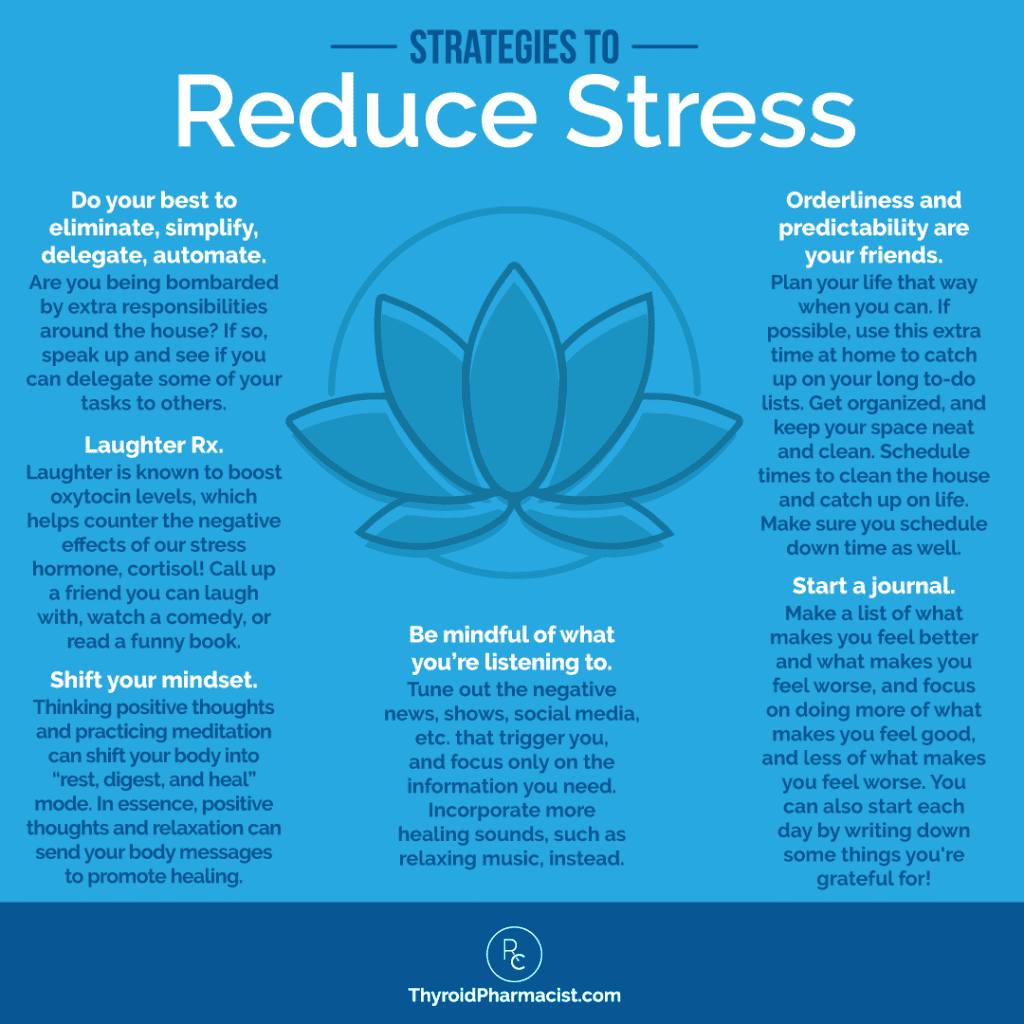
4. Reduce Inflammation
In addition to reducing stress, reducing inflammation helps support healthy adrenal function and, in turn, healthy thyroid function.
Food sensitivities are a common source of inflammation. [12] Gluten, dairy, and soy are the most common reactive foods in Hashimoto’s, and eliminating them will eliminate inflammation in your body. Elimination diets and food sensitivity testing may help you determine additional foods that may need to be removed from your diet. I have an article on food sensitivities that you can read for more information.
Chronic infections are also a common source of inflammation in the body. [13] Common infections I see in those with Hashimoto’s include H. pylori, Blastocystis hominis, and Candida, but there are numerous potential infections that can be root causes as well.
S. boulardii is one key supplement that I started recommending for people with Hashimoto’s. It tends to be a broad spectrum, gentle, beneficial yeast that can be a tool in lowering gut inflammation from past use of antibiotics, infections, and dysbiosis, by helping with re-establishing a healthy gut flora. I think of it as a one-stop shop for lowering gut inflammation. [14] ?
5. Replenish Nutrients and Electrolytes
The salt cravings and feelings of dehydration that occur with adrenal fatigue, are our body’s way of letting us know that we need more salt. Rather than reaching for processed foods or thyroid-toxic iodized salt, including a good-quality sea salt in your diet may help if you feel a bit dizzy getting up in the morning or after a hot bath, or have other symptoms of adrenal fatigue.
I like to recommend buying a pink or gray sea salt and making yourself a salty drink, such as sole — a drink made of filtered water and pink Himalayan salt (recipe is included in the graphic below) — each morning, and sipping it throughout the day. Homemade bone broths with plenty of sea salt are also a great and tasty way to re-hydrate. An electrolyte supplement can also be useful for keeping up proper hydration levels.
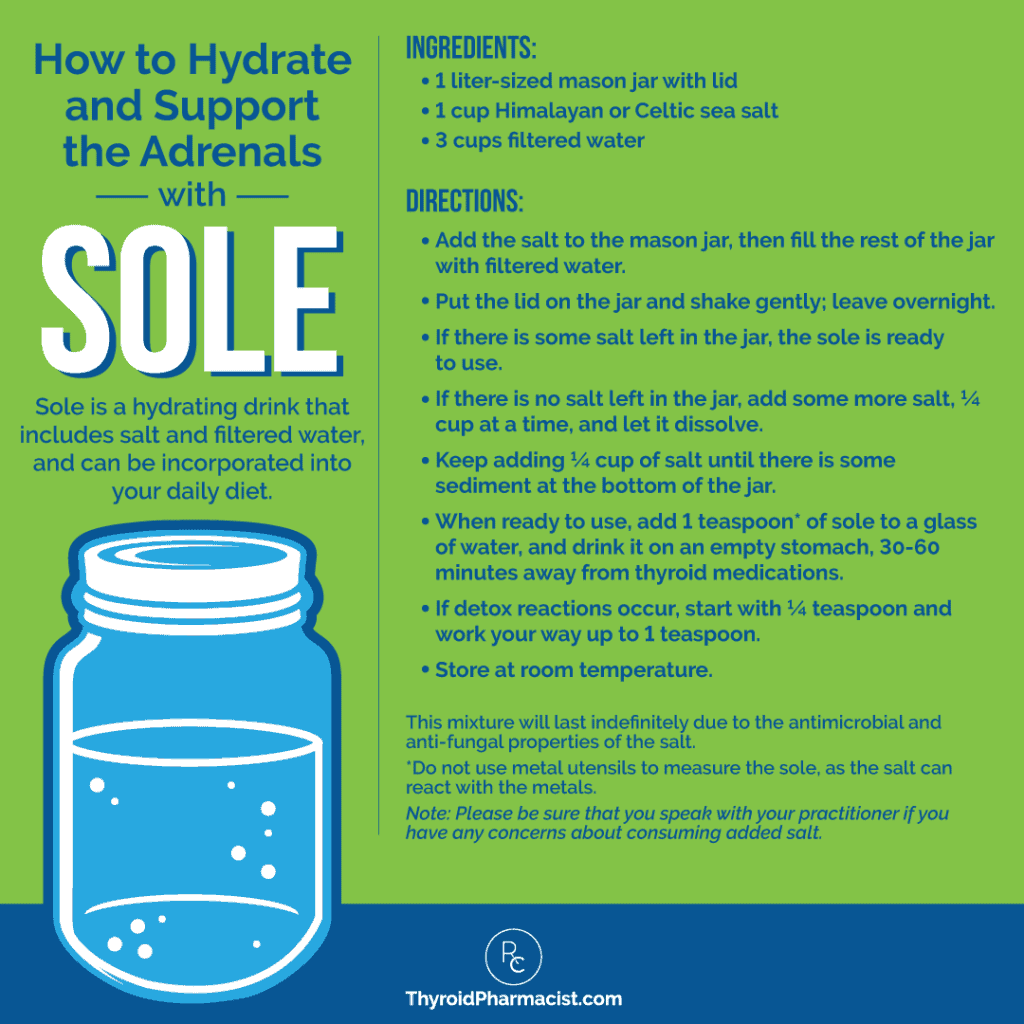
In addition to sole, another drink that is great for adrenal fatigue is called the “Adrenal Kickstart.” It consists of fresh orange juice (best if cold-pressed or freshly squeezed and organic), a fat such as coconut cream or coconut milk, and sea salt.
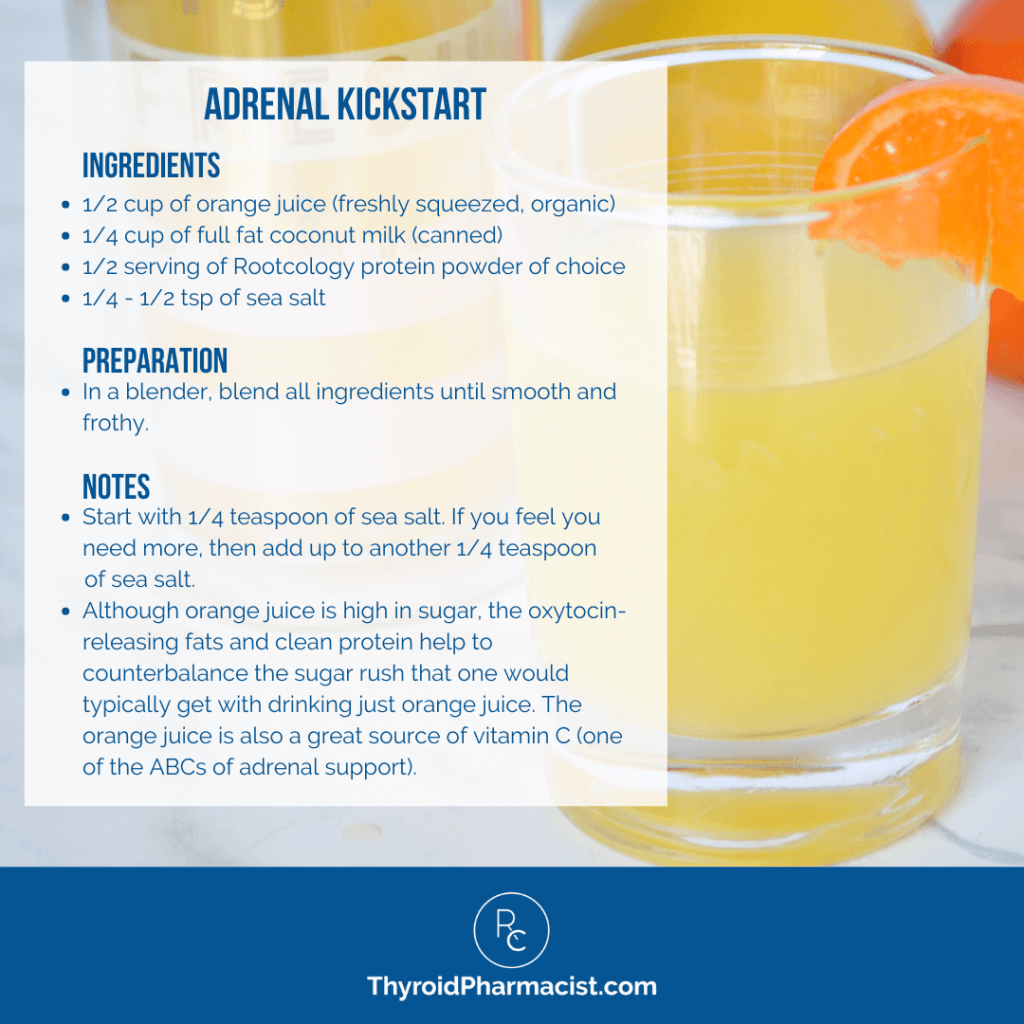
The vitamin C in the orange juice supports the adrenals (the benefits of vitamin C are discussed in depth in the next section). Although orange juice is high in sugar, we are balancing it with oxytocin-releasing fats and clean protein, so this helps to counterbalance the sugar rush one would typically get with drinking just orange juice.
Furthermore, the fats from the coconut and protein powder help with satiety and blood sugar balance, and the sea salt directly supports healthy cortisol production.
6. Build Resilience with Supplements
While supplements often need to be individualized for people depending on their level of adrenal dysfunction (which needs to be determined via testing), I have found that most people with Hashimoto’s feel better when they utilize the ABCs of adrenal supplements.
The ABCs are Adrenal Adaptogens, B Vitamins, and Vitamin C.
Adaptogenic herbs are any natural herb products that support the body’s ability to deal with stressors. [15] In order to be considered an adaptogen, an herb must possess three main qualities. First, the herb must be non-toxic to the patient at normal doses. Secondly, the herb should help the entire body to cope with stress. Finally, the herb should help the body to return to “normal” regardless of how stress is currently affecting the person’s functioning. In other words, an adaptogenic herb needs to be able to both tone down overactive systems and boost underactive systems in the body. Adaptogens are thought to normalize the hypothalamic-pituitary-adrenal (HPA) axis. [16]
Adaptogenic herbs include: ashwagandha, astragalus, reishi mushroom, dang shen, eleuthero, ginseng, jiaogulan, licorice, maca, schisandra, spikenard, and suma. These are examples of herbs that may increase the body’s ability to resist stress, and have been helpful in relieving adrenal dysfunction when used in combination with vitamins and minerals.
I personally love using adaptogens. I always joke that adaptogens make other people in my life much easier to tolerate. ? I have taken adrenal adaptogens on and off since 2012. I like to use more of them around holidays and periods of stress, and they really help me stay balanced. I did stop them during pregnancy, and getting back on them is one of the things I looked forward to the most, with the exception of my little one’s arrival of course. ?
Vitamin C and B vitamins become depleted during high cortisol production.
In particular, deficiencies in pantothenic acid and biotin (vitamins in the “B” family), have been linked to decreased adrenal function in animals and humans. [17]
Vitamin C is an important antioxidant that helps support the adrenals, mitochondria, collagen production, and the suppression of a reactivated Epstein-Barr virus infection, along with many other potential viruses. [18] It’s easy to see how stress can make us vulnerable to catching everything that’s going around, as well as to latent infections reactivating in our bodies.
While some may wish to obtain these nutrients from natural whole food sources, this is not always possible. This is due to gut issues, which can usually result in people with Hashimoto’s having an impaired ability to extract vitamins and minerals from food.
Rootcology’s ABC Blend: Adrenal Support
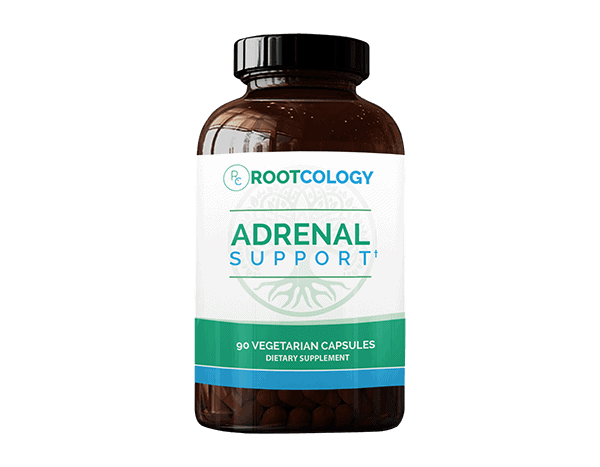
I created the supplement Rootcology Adrenal Support to use a combination of the ABCs I recommend for balancing the adrenals: Adaptogens, B vitamins and vitamin C. This blend of adaptogenic herbs, vitamins, minerals, and amino acids is designed to support the adrenals and provide a powerful defense from the mental and physical factors associated with occasional stress. The formula synergistically supports mental relaxation while counteracting the metabolic effects of occasional stress as well.
I included ashwagandha in the blend, as ashwagandha has research-supported benefits for thyroid health. A 2018 study examined the effect of ashwagandha on people with elevated TSH levels over a period of eight weeks, and found that compared to the control group, the TSH levels of participants receiving ashwagandha improved significantly, as did T3 and T4 levels, effectively normalizing thyroid function. [19] Please note, ashwagandha is a nightshade, so if you have nightshade sensitivity, you may be sensitive to ashwagandha. (However, some people may only be sensitive to certain nightshades and may tolerate it.)
I also added licorice to this blend. Licorice was one of the herbs that helped me the most in overcoming fatigue. Licorice root extract prevents the breakdown of cortisol into inactive cortisone. [20] Thus, it keeps our cortisol around longer, giving us more energy. It may be helpful for those with low cortisol and low blood pressure. Please note, it should not be used by those with water retention or high blood pressure.
I generally recommend using the ABCs long-term, as life is inevitably full of stress. For added convenience, you can subscribe to get Adrenal Support delivered straight to your door on a monthly or bimonthly basis.
Alternative ABC Blend by Pure Encapsulations
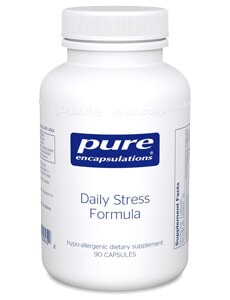 Daily Stress Formula – For those who have high blood pressure or have a sensitivity to licorice, I like recommending the ABC blend by Pure Encapsulations, which has a similar formulation to the Rootcology ABC blend, but does not contain licorice.
Daily Stress Formula – For those who have high blood pressure or have a sensitivity to licorice, I like recommending the ABC blend by Pure Encapsulations, which has a similar formulation to the Rootcology ABC blend, but does not contain licorice.
Additional Supportive Nutrients
In some cases, you may benefit from additional B vitamins and vitamin C, as well as magnesium, to support your adrenals.
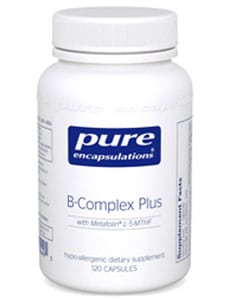 B Complex Plus – B vitamins play an important role in cell metabolism, thyroid function, and adrenal function. They become depleted in stressful situations that often precede the development of autoimmunity. Four especially important B vitamins are pantothenic acid (B5), thiamine or benfotiamine (B1), biotin (B7), and cobalamin (B12). This exceptional combination of B vitamins, including vitamins B1, B2, B3, B5, B6, B12, biotin, and folate (as Metafolin L-5-MTHF), should be helpful for most people with low energy levels. B vitamins are water-soluble vitamins and do not build up in the body, so the risk for toxicity is almost nonexistent.
B Complex Plus – B vitamins play an important role in cell metabolism, thyroid function, and adrenal function. They become depleted in stressful situations that often precede the development of autoimmunity. Four especially important B vitamins are pantothenic acid (B5), thiamine or benfotiamine (B1), biotin (B7), and cobalamin (B12). This exceptional combination of B vitamins, including vitamins B1, B2, B3, B5, B6, B12, biotin, and folate (as Metafolin L-5-MTHF), should be helpful for most people with low energy levels. B vitamins are water-soluble vitamins and do not build up in the body, so the risk for toxicity is almost nonexistent.
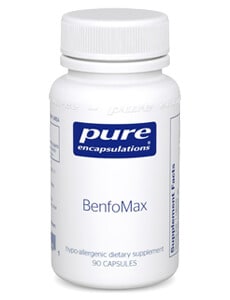 BenfoMax – Thiamine is one of the B vitamins, known as B1. It supports blood sugar function and the adrenals, and can boost our energy levels. It also has the important roles of converting carbohydrates into energy and aiding with the digestion of proteins and fats. Thiamine is required for proper release of hydrochloric acid in our stomachs, which is needed for proper protein digestion. (Most people with Hashimoto’s have little or no stomach acid.) The latest research suggests that a mild deficiency may exist in people with autoimmune disease and related malabsorption issues. [21] If you’ve been struggling with fatigue, low stomach acid, carbohydrate intolerance, low blood pressure, and your adrenals, you may benefit from up to 600 mg of thiamine a day.
BenfoMax – Thiamine is one of the B vitamins, known as B1. It supports blood sugar function and the adrenals, and can boost our energy levels. It also has the important roles of converting carbohydrates into energy and aiding with the digestion of proteins and fats. Thiamine is required for proper release of hydrochloric acid in our stomachs, which is needed for proper protein digestion. (Most people with Hashimoto’s have little or no stomach acid.) The latest research suggests that a mild deficiency may exist in people with autoimmune disease and related malabsorption issues. [21] If you’ve been struggling with fatigue, low stomach acid, carbohydrate intolerance, low blood pressure, and your adrenals, you may benefit from up to 600 mg of thiamine a day.
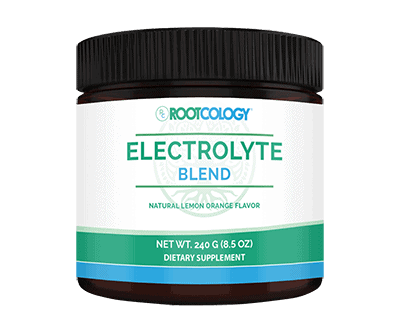 Vitamin C – Vitamin C is essential for supporting adrenal function. I recommend doses of 500 mg to 3,000 mg per day, as tolerated. My favorite way to get vitamin C is through Rootcology’s Electrolyte Blend, as it’s important for adrenal function to stay hydrated and keep our electrolytes in balance. (This also helps to strengthen the body’s immune response.) As an added bonus, this blend also contains D-ribose, which supports our energy-producing powerhouses, the mitochondria.
Vitamin C – Vitamin C is essential for supporting adrenal function. I recommend doses of 500 mg to 3,000 mg per day, as tolerated. My favorite way to get vitamin C is through Rootcology’s Electrolyte Blend, as it’s important for adrenal function to stay hydrated and keep our electrolytes in balance. (This also helps to strengthen the body’s immune response.) As an added bonus, this blend also contains D-ribose, which supports our energy-producing powerhouses, the mitochondria.
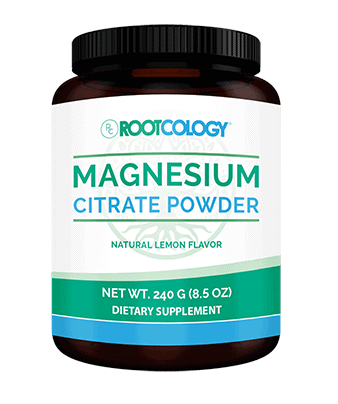 Magnesium Citrate – As magnesium is depleted by stress and is often difficult to obtain from foods, most people will benefit from long-term supplementation. It is also excellent for promoting relaxation and sleep. The citrate version can also help with bowel movements (one of the less glamorous symptoms of hypothyroidism).
Magnesium Citrate – As magnesium is depleted by stress and is often difficult to obtain from foods, most people will benefit from long-term supplementation. It is also excellent for promoting relaxation and sleep. The citrate version can also help with bowel movements (one of the less glamorous symptoms of hypothyroidism).
Advanced Strategies
While many cases of adrenal dysfunction are caused by current stress, and removing or modifying how we respond to those stressors can help with overcoming adrenal dysfunction, in some cases, additional interventions may be needed to address past traumatic stress, as well as the chronically altered release of adrenal hormones.
Traumatic Stress
Traumatic stress may lead to a chronic pattern of adrenal hormone dysfunction. Various types of traumas and abuse have been tied to autoimmune conditions and thyroid hormone abnormalities. [22] Many of my clients have experienced significant traumas such as the loss of a loved one and/or being in an abusive relationship, before the onset of Hashimoto’s. Some of us have also experienced childhood trauma, which can set the tone for altered hormone patterns in adulthood.
Resolving traumatic stress usually requires a targeted therapy (I prefer neurofeedback and EMDR), and is a bit beyond the scope of this article, so until I have a chance to write an article on this topic, you may want to read my book, Hashimoto’s Protocol, as it contains a chapter entirely dedicated to this subject. My new book, Adrenal Transformation Protocol, will also address emotional and psychological stress.
Supplemental Hormones
A variety of hormones and adrenal-supporting substances may be used based on your lab test results and adrenal dysfunction stage.
Although most of these hormones are available over the counter at health food stores, they are certainly not benign and should be used under the supervision of a trained professional with extreme caution. Not everyone will need all of these supplements.
Your practitioner may utilize progesterone, pregnenolone, DHEA, 7-Keto, adrenal glandulars, and in some cases, the medication hydrocortisone, to rebalance your adrenals.
I used to believe that healing the adrenals required hormones, sleeping 12+ hours a day, and quitting caffeine for three to 24 months in order to heal… until I found myself in adrenal dysfunction as a new mom, and realized that the strategies I once used as a young woman would no longer work.
Fortunately, I found a much simpler and effective solution to transforming one’s adrenals into a healing state, in just four weeks! I shifted from surviving to thriving – yes, even as a sleep deprived new mom who was drinking 2 cups of coffee per day – and decided to pilot this program with my clients in 2020. Over 3000 people have now taken my Adrenal Transformation Program, and the results have been incredible!
- 92 percent of people reduced their brain fog!
- 89 percent of people had less fatigue
- 86 percent reported less anxiety after the program
- 85 percent had less irritability
- 82 percent had less morning fatigue
- 81 percent improved their sleep
- 81 percent improved their libido
- 80 percent reduced their nervousness
- 78 percent reduced feelings of depression
- 77 percent had fewer mood swings
- 76 percent reduced their joint pain
Based on the results I have seen with my Adrenal Transformation Program participants, I believe that most people can heal their stress response in just four weeks, even without sleeping for 12 hours a night, without quitting caffeine, and without taking hormones. ? Learn more about that in my new book, Adrenal Transformation Protocol!
Monitoring Your Thyroid Hormones When Taking Supplements
Whenever you start a lifestyle or complementary intervention to address Hashimoto’s or adrenal issues, I encourage you to work with your doctor to monitor your thyroid symptoms, thyroid hormones, and thyroid antibodies. This is a great idea for any lifestyle intervention, but a must for lifestyle changes that could impact your TSH, especially if you are already taking thyroid medications.
The supplements listed above could impact your TSH and need for thyroid medications. So as you move forward with supplementation, please look out for the following symptoms of being overmedicated: rapid or irregular heartbeat, nervousness, irritability or mood swings, muscle weakness or tremors, diarrhea, heat intolerance, menstrual irregularities, hair loss, weight loss, insomnia, chest pain, and/or excessive sweating.
I recommend testing thyroid hormone levels every six to 12 weeks while using complementary therapies, including root cause medicine, diet, or supplements, to ensure your thyroid medication dosage is optimized — or sooner, if you are showing any of the above symptoms. Thyroid medications are goldilocks hormones — they need to be used in just the right dose — and there are risk factors of being overmedicated.
Testing TSH, T4, T3, and the two most common Hashimoto’s antibodies (TPO and TG antibodies — you can read more about such tests here) is an important part of ensuring that the lifestyle changes you are making are both safe and helpful. ?
If your doctor is ordering these thyroid labs for you, be sure to request a copy so that you can see them for yourself and ensure that they are interpreted correctly. If you aren’t able to use your physician for ordering, or have a high deductible insurance plan like I do, you may also wish to self-order your own thyroid monitoring labs. I recommend the Ulta Labs thyroid panel for monitoring your progress, which can be ordered anywhere in the U.S. (some, but not all, insurance companies may reimburse you for self-ordered labs, please be sure to check with your plan).
The Takeaway
The adrenals are two small glands that release very important “stress hormones,” which impact many functions throughout the body, including stress tolerance, inflammation, blood sugar, and body fat. When the body is under constant stress, the adrenal glands eventually become overwhelmed and desensitized, resulting in adrenal dysfunction.
Supporting the adrenals is one of the first things I recommend for all of my clients, as adrenal dysfunction is almost always a factor in Hashimoto’s. It can result in many of the symptoms we often perceive to be a result of our thyroid condition, like fatigue, feeling overwhelmed, trouble concentrating, and a decreased ability to handle stress.
By taking a root cause approach, including getting more rest, balancing blood sugar, reducing stress and inflammation, replenishing nutrients, and building resilience with supplements (like the ABCs in Rootcology’s Adrenal Support), we can help to reduce the impact of stress on the adrenals… and reduce or eliminate many of those symptoms!
I’ve had to heal my own adrenals (more than once!), and I’ve helped thousands of my readers over the years do the same. Through my years of experience, I’ve developed my own process based on extensive research and lots of experimenting on myself. ? I’ve been offering this process to my readers as the Adrenal Transformation Program for the last several years.
This program has had such tremendous success that I wanted to turn it into a book, to reach and help even more people! I’m so excited about the release of my newest book, Adrenal Transformation Protocol, this spring, in which I detail my exact process for healing the adrenals. With a simple four-week program to help identify your adrenal triggers, balance your stress response, and gradually build up your resilience to prevent excess stress from overwhelming your adrenals, my book Adrenal Transformation Protocol will set you up with a strong foundation to support your adrenals now and in the future. You can pre-order your copy here.
I wish you the best of luck on your healing journey!
P.S. You can also download a free Thyroid Diet Guide, 10 thyroid-friendly recipes, and the Nutrient Depletions and Digestion chapter of my first book for free, by signing up for my weekly newsletter. You will also receive occasional updates about new research, resources, giveaways, and helpful information.
For future updates, make sure to follow us on Facebook, Instagram, Pinterest, and TikTok!
References
[1] Thau L, Gandhi J, Sharma S. Physiology, Cortisol. In: StatPearls. Treasure Island (FL): StatPearls Publishing; August 29, 2022.
[2] Cook SB. Current Controversy: Does Adrenal Fatigue Exist?. Natural Medicine Journal. 2017;9(10).
[3] Mariotti A. The effects of chronic stress on health: new insights into the molecular mechanisms of brain-body communication. Future Sci OA. 2015;1(3):FSO23. Published 2015 Nov 1. doi:10.4155/fso.15.21; Harvard Health Publishing. Understanding the stress response. Harvard Health Publishing. https://www.health.harvard.edu/staying-healthy/understanding-the-stress-response. Published March 2011. Updated March 18, 2016. Accessed February 25, 2018.
[4] Cook SB. Current Controversy: Does Adrenal Fatigue Exist?. Natural Medicine Journal. 2017;9(10).
[5] Nicolaides NC, Vgontzas AN, Kritikou I, Chrousos G. HPA Axis and Sleep. In: Feingold KR, Anawalt B, Boyce A, et al., eds. Endotext. South Dartmouth (MA): MDText.com, Inc.; November 24, 2020.
[6] Gierach M, Gierach J, Skowrońska A, et al. Hashimoto’s thyroiditis and carbohydrate metabolism disorders in patients hospitalised in the Department of Endocrinology and Diabetology of Ludwik Rydygier Collegium Medicum in Bydgoszcz between 2001 and 2010. Endokrynol Pol. 2012;63(1):14-17.
[7] Sprague JE, Arbeláez AM. Glucose counterregulatory responses to hypoglycemia. Pediatr Endocrinol Rev. 2011;9(1):463-475.
[8] Hannibal KE, Bishop MD. Chronic stress, cortisol dysfunction, and pain: a psychoneuroendocrine rationale for stress management in pain rehabilitation. Phys Ther. 2014;94(12):1816-1825. doi:10.2522/ptj.20130597
[9] Symptoms & causes of adrenal insufficiency & addison’s disease. National Institute of Diabetes and Digestive and Kidney Diseases. https://www.niddk.nih.gov/health-information/endocrine-diseases /adrenal-insufficiency-addisons-disease/symptoms-causes. Published September 2018. Accessed December 14, 2022.; Munver R, Volfson IA. Adrenal insufficiency: diagnosis and management. Curr Urol Rep. 2006;7(1):80-85. doi:10.1007/s11934-006-0046-5
[10] Munver R, Volfson IA. Adrenal insufficiency: diagnosis and management. Curr Urol Rep. 2006;7(1):80-85. doi:10.1007/s11934-006-0046-5
[11] Cadegiani F, Kater C. Adrenal fatigue does not exist: a systematic review. BMC Endocr Disord. 2016;16(1). doi:10.1186/s12902-016-0128-4.
[12] Ohtsuka Y. Food intolerance and mucosal inflammation. Pediatr Int. 2015;57(1):22-29. doi:10.1111/ped.12546
[13] Furman D, Campisi J, Verdin E, et al. Chronic inflammation in the etiology of disease across the life span. Nat Med. 2019;25(12):1822-1832. doi:10.1038/s41591-019-0675-0
[14] Terciolo C, Dapoigny M, Andre F. Beneficial effects of Saccharomyces boulardii CNCM I-745 on clinical disorders associated with intestinal barrier disruption. Clin Exp Gastroenterol. 2019;12:67-82. Published 2019 Feb 11. doi:10.2147/CEG.S181590
[15] Todorova V, Ivanov K, Delattre C, Nalbantova V, Karcheva-Bahchevanska D, Ivanova S. Plant Adaptogens-History and Future Perspectives. Nutrients. 2021;13(8):2861. Published 2021 Aug 20. doi:10.3390/nu13082861
[16] Panossian A, Wikman G. Effects of Adaptogens on the Central Nervous System and the Molecular Mechanisms Associated with Their Stress-Protective Activity. Pharmaceuticals (Basel). 2010;3(1):188-224. Published 2010 Jan 19. doi:10.3390/ph3010188
[17] Pan L, Jaroenporn S, Yamamoto T, et al. Effects of pantothenic acid supplement on secretion of steroids by the adrenal cortex in female rats. Reprod Med Biol. 2011;11(2):101-104. Published 2011 Dec
[18] Valdés F. Vitamina C [Vitamin C]. Actas Dermosifiliogr. 2006;97(9):557-568. doi:10.1016/s0001-7310(06)73466-4
[19] Sharma AK, Basu I, Singh S. Efficacy and Safety of Ashwagandha Root Extract in Subclinical Hypothyroid Patients: A Double-Blind, Randomized Placebo-Controlled Trial. J Altern Complement Med. 2018;24(3):243-248. doi:10.1089/acm.2017.0183
[20] Armanini D, Fiore C, Mattarello MJ, Bielenberg J, Palermo M. History of the endocrine effects of licorice. Exp Clin Endocrinol Diabetes. 2002;110(6):257-261. doi:10.1055/s-2002-34587
[21] Ji Z, Fan Z, Zhang Y, et al. Thiamine deficiency promotes T cell infiltration in experimental autoimmune encephalomyelitis: the involvement of CCL2. J Immunol. 2014;193(5):2157-2167. doi:10.4049/jimmunol.1302702
[22] Dube SR, Fairweather D, Pearson WS, Felitti VJ, Anda RF, Croft JB. Cumulative childhood stress and autoimmune diseases in adults. Psychosom Med. 2009;71(2):243-250. doi:10.1097/PSY.0b013e 3181907888; Jung SJ, Kang JH, Roberts AL, et al. Posttraumatic stress disorder and incidence of thyroid dysfunction in women. Psychol Med. 2019;49(15):2551-2560. doi:10.1017/S0033291718003495
Note: Originally published in October 2016, this article has been revised and updated for accuracy and thoroughness.


